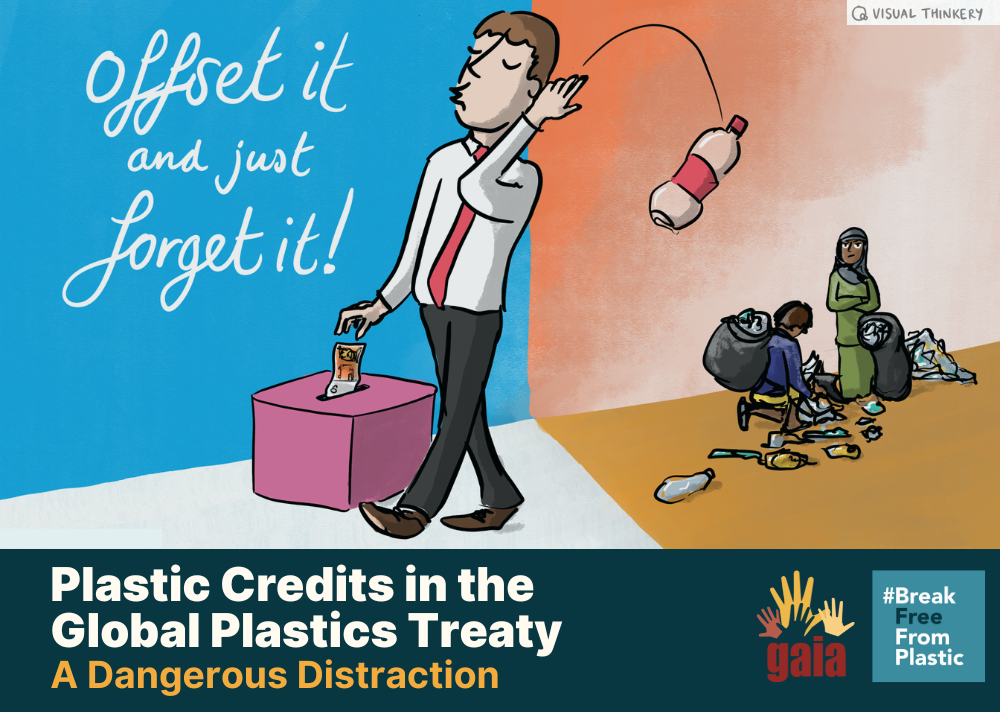Plastic offsets and credits will not tackle plastic pollution or channel finance to where it is most needed in a stable, long term and reliable way. Multiple investigations and reports have found that the burgeoning plastic credits and offsetting system is flawed and does nothing to avoid the generation of plastic pollution, nor does it reduce the use of virgin plastic. As such, plastic credits should not be incorporated into the financial mechanisms of a future plastic treaty.
Plastic credits do not reduce plastic pollution - companies who purchase credits are under no obligation to take action to reduce the amount of plastic they use. In fact, purchasing credits may act as a distraction from meaningful action while giving the impression a company is sustainable, especially when they term themselves ‘plastic neutral’ because of credit purchases.
Plastic credits encourage burning of plastic, releasing harmful emissions including microplastics and endangering health - a study of projects on one credit marketplace PCX Markets found that 86% of projects at the time of publication were generating credits from burning plastic, mostly in cement kilns. Companies were encouraged to purchase these credits as they were sold at a lower price than recycling credits.
Credits within EPR systems or when used as an alternative system are unstable and ineffective - credits offer unstable funding for waste treatment, with prices set in opaque systems and not according to the actual costs of waste treatment. Credits risk complicating EPR systems, delaying their implementation, and handing control to the private financial sector, away from policy makers. It is also unclear how credits embedded in EPR systems support municipalities with regard to costly waste management services. Unfortunately, credits generated are only linked to collected plastic waste, instead of actually enabling accountability for producers and encouraging them to change their packaging to be more sustainable.
Many schemes fail to show additionality, meaning that no additional action has happened as a result of the purchase of the credit. Of Verra’s registered projects up to October 2023, 42% of projects had been operating for more than 5 years before a single credit was sold, and 8 projects had been operating for 7 years. This runs counter to Verra’s claims that the sale of credits enables an activity that could not happen without the financial support of the credit sale.
Claims that credits uplift wastepickers do not stand up - while there is a lack of transparency on how much workers are paid for their labour and what other benefits are offered, Verra’s standard only requires workers to be paid ‘market rate’ for collecting waste.
Community consultation is insufficient, and complaints of harm are being made - genuine community engagement on the impact of credit generating schemes is lacking. One community complained of health impacts and negative smells from the Reciki project in Indonesia leading to it being suspended.
Plastic credits legitimise waste colonialism and place the burden for global north plastic use on the global south - as stated by S. Moon et. al (2024 preprint) ‘By instrumentalizing the labor and tacit experiential knowledge of waste pickers and incentivizing activities at lower levels of the waste hierarchy, plastic credits risk creating a systemic lock-in. This lock-in allows credit-purchasing actors to financially benefit from externalizing pollution reduction activities and resist environmentally preferable interventions, such as plastic production reduction or alternative business models that could optimize plastic demand. This not only legitimizes ongoing waste generation but also institutionalizes exploitative practices, posing significant challenges to ending plastic pollution and to achieving a just transition.’
Plastic credits create incentives to increase plastic production and pollution. Plastic credits create financial flows that depend on ongoing plastic production and pollution, undermining upstream efforts to reduce production and creating financial dependence on ongoing pollution.
Recommendation
Instead of enabling and encouraging unproven, novel financial mechanisms, the treaty must
include a strong, dedicated financial mechanism to facilitate the flow of financial resources from the developed to the developing world, particularly for Small Island Developing States (SIDS) and Least Developed Countries (LDCs), based on a clear grant basis, equitable process, and replenishable funds. Financial mechanisms should strictly follow the zero waste hierarchy, focusing investment on initiatives that address plastic production, waste prevention, reuse systems and preparation for reuse instead of downstream interventions such as recycling and end-of-life treatment. The financial mechanism should make funds available to promote and facilitate a just transition. Countries must include the activities and just transition measures to be funded in their national planning processes.
For more information:
Emma Priestland Emma@breakfreefromplastic.org
Neil Tangri Neil@no-burn.org




